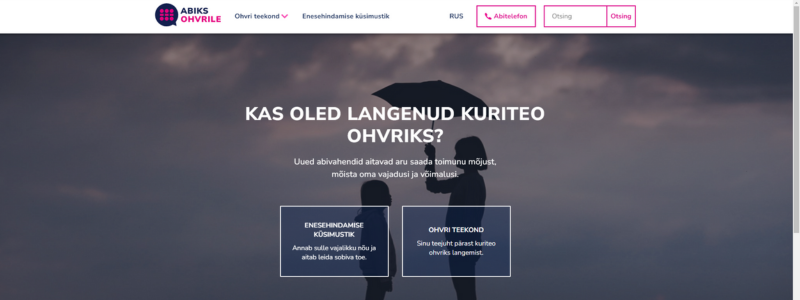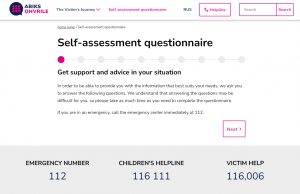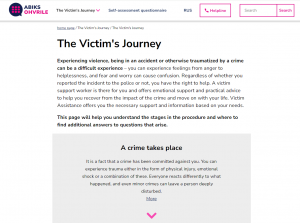
The AREV project launches new tools to support victims of crime
Life can be difficult for people who have become victims of crime. However, the AREV project has designed a set of tools that will enable potential victims to better understand what has happened, to find the help they require, and to support their needs.
According to Anna-Liisa Uisu, Criminal Policy Adviser at the Ministry of Justice, the new tools are intended to support victims of crime and the challenges they may face. “Professionals may have to share specific, and sometimes complex, information with victims of crime. Subsequently, victims may find it difficult to navigate the maze of existing support services and associated complex procedures. AREV’s self-assessment questionnaire and Victim’s Journey have been developed to address these issues; providing victims with clear information and guidance on the criminal justice system and enabling them to access Estonian support services.” explained Anna-Liisa Uisk.

Self-assessment Questionnaire
This tool is specifically designed for use with all victims of crime, including those who may not consider themselves victims or who are not sure whether they have been victimised. As it can be difficult for victims to gain access to support services, completing the self-assessment questionnaire will encourage those in need to seek help from professionals themselves. The questionnaire can be used by victims to identify their needs, and based on their individual responses, (potential) victims will receive personalised advice and appropriate guidance.

Victim’s Journey
Criminal proceedings can be discouragingly complex. The aim of the Victim’s Journey is to help victims understand the criminal justice procedure and its various phases, from filing a complaint to being questioned by the police to attending a court hearing. It explains the roles played by relevant professionals – police officers, prosecutors and judges, among others – and how they support the victim throughout the legal process. It also highlights the rights of victims of crime and the support services available during the victim’s journey towards justice: from the time of the crime to the court proceedings.
The above tools have been designed to encourage victims to reach out to the police for help. However, according to Andrea Kink, head of the Social Insurance Board’s development team for Services for Victims of Violence, the Estonian victim support system gives victims access to a variety of services, whether they report the crime or not. “We encourage people to contact the Victim Support hotline, 116 006, or their regional victim support services for support, and advice and assistance tailored to their needs; victim support workers are happy to provide further information on the services available,” said Andrea Kink.
“These tools enable personalised advice to be provided, advice that meets the person’s own needs. By helping the victim understand the impact the incident has on their life, they are better able to make informed decisions. The tools help victims of crime on their journey towards justice by increasing their knowledge and improving their understanding of criminal procedure,” said Anna-Liisa Uisk from the Ministry of Justice.
Both tools were developed within the framework of the AREV project (Advancing the Rights of Estonian Victims) by the Estonian Ministry of Justice and Victim Support Europe. The project team encourages anyone who has been a victim of crime to learn more about the tools. For further information about these tools, visit abiksohvrile.just.ee.
The AREV project aims to promote the rights of victims of crime in Estonia by developing and improving measures to protect and support crime victims. The project was implemented with funding from the European Union’s Structural Reform Support Programme, and managed by the European Commission’s Directorate-General for Structural Reform Support.

